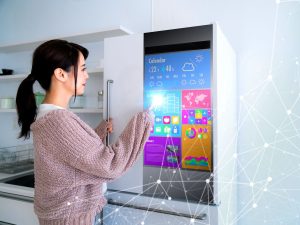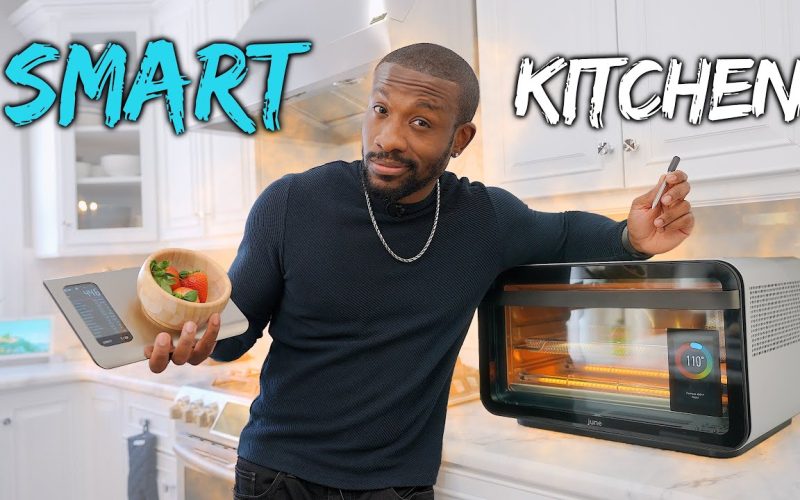Introduction
Healthy eating is very important for our well-being. Yet, many of us struggle to find time to cook tasty and nutritious meals every day. With busy work schedules and daily chores, planning healthy meals can be a big challenge. In 2025, smart kitchen devices are here to help.
They bring modern technology into the kitchen to make cooking easier. These devices help you manage your recipes, measure food accurately, and even suggest healthy options based on the ingredients you have. This guide will explain how these gadgets work and share simple tips to help you get started.
What Are Smart Kitchen Devices?

Smart kitchen devices are modern tools that use technology to help with cooking. They connect to the internet and work with apps on your phone or tablet. These devices include smart fridges, ovens, cooktops, and even digital recipe assistants.
They can monitor food, adjust cooking settings, and give you real-time tips. With these gadgets, your kitchen can help you plan meals and track nutrition automatically.
Types of Smart Kitchen Devices

Let’s look at some popular types of smart kitchen devices and their roles:
1. Smart Fridges
A smart fridge is more than just a refrigerator. It has built-in cameras and sensors to track food inventory. It tells you when items are running low or when they are about to expire. This helps you plan your meals and reduces food waste. The fridge can even suggest healthy recipes using the ingredients you have.
2. Smart Ovens and Cooktops
Smart ovens and cooktops take away the guesswork from cooking. They come with pre-set programs and can adjust the cooking temperature automatically. They may connect with your smartphone to let you set timers or receive notifications when your meal is ready. These devices ensure that your food is cooked evenly and correctly, which helps to maintain nutritional value.
3. AI-Powered Recipe Assistants
Recipe assistants are apps that help you decide what to cook. They check what you have in your kitchen and suggest recipes that match your ingredients. These tools can help you discover new healthy meals and plan your diet better. With their AI technology, they learn your taste and recommend recipes that suit your goals.
4. Smart Scales and Nutrition Trackers
Smart scales help you measure food portions with precision. When used with nutrition trackers, they offer detailed feedback about the food you prepare. These devices tell you about calorie counts, fat content, and other nutritional facts. By tracking this data, you can manage your diet and improve your eating habits.
5. Robotic Kitchen Assistants
Robotic assistants are emerging tools in the smart kitchen. They can help chop vegetables, stir sauces, or even clean up after cooking. While still in the early stages, these devices are growing in popularity. They reduce the time spent on tedious tasks and let you focus more on creative cooking. For busy families, a robotic kitchen assistant can be a valuable helper.
6. Smart Dishwashers
Smart dishwashers use sensors to detect how dirty the dishes are. They adjust water and energy use based on the load. This feature not only saves energy but also ensures that dishes come out clean. In a smart kitchen, these appliances add to the overall convenience and efficiency of your home.
7. Connected Coffee Makers and Beverage Systems
Smart coffee makers and other connected beverage systems customize your drink to your taste. They allow you to set brewing times and control the strength and temperature of your coffee or tea. This means you wake up to a perfect cup every day. These gadgets enhance your kitchen experience by making morning routines smoother.
How to Get Started with Smart Kitchen Devices

If you are new to smart kitchen devices, here are some steps to help you begin:
- Assess Your Kitchen Needs: Think about the tasks that take most of your time, such as meal planning or portioning food. Determine which devices will save you time and effort.
- Connect Your Devices: Use smartphone apps to connect and control your smart kitchen devices. This creates a seamless experience and makes it easier to monitor your health and cooking.
- Learn the Features: Take some time to read the manual or watch online tutorials for your new gadgets. The more you know, the easier it is to get the most out of them.
- Monitor Your Progress: Track your improvements in meal planning, food waste reduction, and energy savings. Adjust your devices’ settings to improve efficiency further.
- Stay Updated: Technology evolves fast. Keep an eye out for new features or updates that can enhance your smart kitchen experience.
The Role of Technology in Healthy Eating

Technology has a strong impact on healthy eating in modern kitchens. Smart kitchen devices do not replace your skills but help enhance them. They make it easier to plan, cook, and serve meals that are full of nutrition. Here are ways technology supports healthy eating:
- Digital Meal Planning: AI-powered apps suggest recipes based on your ingredients. They help you decide what to cook and use what you already have.
- Accurate Measurements: Smart scales ensure you add the correct portions. This helps keep your diet balanced.
- Nutritional Tracking: Apps track your meals and give you a detailed breakdown of what you eat. This lets you adjust your diet as needed.
- Cooking Precision: Smart ovens and cooktops allow you to control the temperature and cooking time. This makes sure your food is not overcooked and keeps nutrients intact.
- Energy Savings: Energy-efficient smart devices use less power. This lowers your bills and helps the environment.
Using these tools, you can make smarter food choices and create a healthier diet. Technology makes it easier to follow recipes, manage portions, and enjoy fresh food every day.
Tips for Healthy Eating with Smart Kitchen Devices

Here are some helpful tips for making the most of your smart kitchen:
- Plan your meals ahead using AI-powered recipe apps. This saves time and ensures a balanced diet.
- Use smart scales to measure ingredients accurately. This helps with portion control.
- Take advantage of smart fridges to keep track of food expiry dates.
- Explore voice-controlled ovens for precise cooking. This can help preserve the nutritional value of food.
- Monitor your energy use with smart dishwashers and other appliances to save money and reduce waste.
- Stay updated with new features and device upgrades to keep your smart kitchen running efficiently.
- Join online communities to learn from others and share your own experiences.
Using these tips will help you create a routine that encourages healthy eating and efficient cooking.
The Future of Smart Kitchens in 2025

Looking ahead, the future of smart kitchen devices is full of promise. In 2025, kitchens will become more connected and efficient. Future innovations may include:
- Greater AI Integration: Future devices will learn more from your habits and offer personalized cooking suggestions.
- Improved Connectivity: Your smart devices will work together even more smoothly. This means easier control over all kitchen gadgets.
- Enhanced Sustainability: New designs will use even less energy and help reduce waste even further.
- Simpler Interfaces: Future smart kitchens will be easier to use. Even those who are not tech-savvy will enjoy the benefits.
- More Customization: Expect options to personalize your kitchen, from cooking settings to nutritional tracking.
As technology continues to advance, the benefits of smart kitchen devices will grow. They will make healthy cooking even easier and more enjoyable, and they will support a sustainable lifestyle.
Conclusion
Smart kitchen devices are set to transform home cooking in 2025. They help plan meals, measure portions, reduce waste, and save energy. These devices make healthy eating easier and more enjoyable. By integrating advanced technology with everyday cooking, they support a balanced and sustainable lifestyle. Adopting these tools can lead to better health, reduced stress, and a greener home. Embrace smart kitchen tech to improve your diet, save time, and lead a healthier life.












